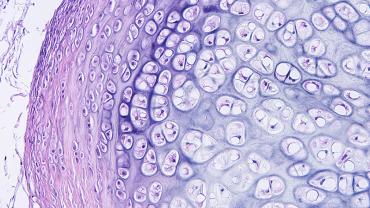
Cartilage tissue plays an important role in the musculoskeletal system, and cartilage cushions the bones inside our joints. This tissue can be negatively impacted by disease, aging, genetics, injury, overuse, and other insults. Cartilage defects may lead to disorders, such as osteoarthritis, rheumatoid arthritis, and intervertebral disc damage, in addition to the need for surgery. Finding ways to support cartilage tissue include dietary supplementation, such as collagen, which may increase the quality of life for those with cartilage defects and associated disorders.
Collagen is one of the most abundant proteins in the body, which is an important function for the structure of cartilage. Degradation and damage to cartilage tissue require the synthesis of more collagen. Even in early osteoarthritis, there is a measurable increase of collagen denaturation and a net loss of collagen. Due to the foundational role of collagen in cartilage development, researchers have investigated whether increasing collagen consumption could repair damaged cartilage.
In a study on mice with an induced meniscal-ligamentous injury in the right knee, oral consumption of hydrolyzed type 1 collagen led to a reduction in inflammation, chondroprotective effects, and dose-dependent increases in the cartilage area and chondrocyte number. In another prospective, randomized, placebo-controlled, double-blind pilot trial on patients with mild knee osteoarthritis, taking 10 grams of collagen supplement with type 2 collagen and proteoglycans for 6 months led to positive changes in cartilage tissue using the delayed Gadolinium-Enhanced Magnetic Resonance Imaging of Cartilage (dGEMRIC) index score compared to a decrease in the control group.
Cartilage repair may be a result of the immunomodulatory effects of collagen, particularly type 2 collagen. This may lead to the activation of macrophages to an M2 phenotype that induces chondrocytes to express cartilage matrix while suppressing the more pathological actions that can damage cartilage.
A recent systematic review assessed the efficacy of using collagen supplements to repair cartilage to help those with osteoarthritis. While the conclusions of the report were that more research is necessary, the authors also concluded that in vivo preclinical studies demonstrated beneficial effects for collagen derivatives, both as nutritional supplementation or as intra-articular delivery. The clinical studies included in the systematic review found symptomatic benefits from collagen, which included the reduction of pain and the improvement of function, but not cartilage repair. However, there were some in vitro studies that had either ineffective or detrimental results from collagen. The researchers also determined that the efficacy of collagen may differ depending on the type and source.
More clinical research is necessary to better understand the underlying mechanisms of cartilage damage to be able to determine whether collagen supplements can repair and restore the damaged cartilage. The studies that are currently available demonstrate that collagen supplementation may provide some benefits through the support of quality of life for certain conditions associated with cartilage damage, such as osteoarthritis.
By Kendra Whitmire, MS, CNS